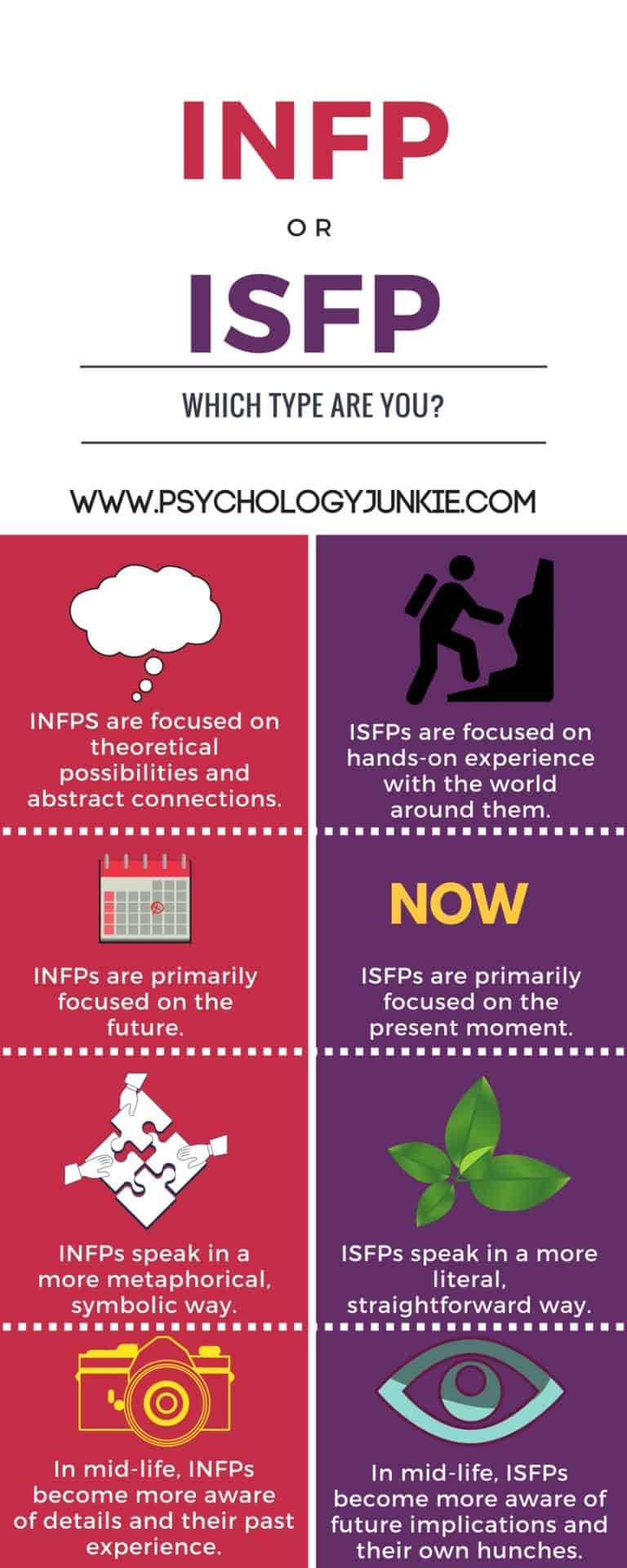
Intp, Intj And Infj, Infp Personality Type, Character Personality
The cognitive functions are a useful tool for revealing the dynamic qualities of personality, translated into the actual practice of living in the real world. The Cognitive Functions in theory and practice The starting point is Carl Jung's theory of cognitive functions.

MBTI ESFP
ISFP cognitive functions. The four-letter types from MBTI theory encode each type's attitudes and preferred cognitive functions. The first letter indicates an introverted vs. extraverted attitude. The second letter indicates the preferred sensing function. The fourth letter indicates a judging vs. perceiving attitude.

ISFP Cognitive Functions Personal Growth & SelfDiscovery Guide for
ISFP Cognitive Functions This personality type has the following cognitive functions: Dominant: The dominant cognitive function for ISFPs is introverted feeling, meaning that they rely on a unique set of values when making decisions.

Distinguishing INFP and ISFP Infp personality type, Infp personality
ISFP Cognitive Functions Introverted Feeling. As their dominant function, ISFPs use Fi most often. This function accounts for the Adventurer's reliance on their own value system when making decisions. Instead of assessing objective criteria, ISFPs consult their principles to determine the right way forward. This cognitive function also.

ISFP sarcastic functions
Written By: K.D. Singh Last Updated On: September 17, 2023 ISFP Cognitive Functions explain the behavior of the ISFP personality. Dominant Introverted Feeling (Fi) & Auxiliary Extroverted Sensing (Se) shape the personality of ISFPs. Tertiary Introverted Intuition (Ni) supports the ISFP personality.

ISFP Personality Type & Cognitive Functions » Erik Thor Esfp, Isfp
Psychology » Personality ISFP Personality Type: The Adventurer By Julia Simkus Updated on June 21, 2023 Reviewed by Saul Mcleod, PhD On This Page: ISFP Meaning ISFP Characteristics Cognitive Functions Hobbies & Careers Work Environments Personal Relationships Tips for Interacting With ISFPs

Are You an ISFP or an INFP? Clarifying a Common Mistype Psychology Junkie
For the ISFP, these cognitive functions serve as the underlying current, guiding the river's flow, lending depth and direction to their unique personalities. Dominant, Auxiliary, Tertiary, and Inferior Functions

Here is a chart of all the different types with their introverted and
Opposing. Extraverted Feeling. Connecting and considering others and the group. Critical Parent. Introverted Sensing. Reviewing and recalling past experiences and seeking detailed data. Deceiving. Extraverted iNtuiting. Interpreting situations and relationships and pickup meanings and interconnections to other contexts.

ISFP Personality Type & Cognitive Functions » FlowCode
The eight cognitive functions include: 1. Introverted Sensing (SI): Introverted sensors rely on past experiences to understand present circumstances. Sensory input—sight, smell, taste, touch, and sound—plays a crucial role in memory recall and instinct.

Intp Decision Making Art & Bussines
Cognitive Functions in ISFPs Personal Relationships With ISFPs Career Paths for ISFPs Tips for Interacting With ISFPs People with an ISFP personality—the Adventurers—have Introverted, Observant, Feeling, and Prospecting personality traits.

Pin on Personality Traits
By Dr. A.J. Drenth "ISFP" is one of sixteen Myers-Briggs personality types. ISFPs comprise about 8-9% of the general population, making them one of the more commonly encountered types. ISFPs are lovers, nurturers, and caregivers. They experience great joy from spending time and making memories with their friends and loved ones.

How to Human
The ISFP cognitive function stack is as follows: 1. Dominant cognitive function = Introverted Feeling (Fi). ISFPs use this function to make judgments based on personal values. 2. Auxiliary cognitive function = Extraverted Sensing (Se). ISFPs use this function to take in information using their five senses. 3.

ISFP The Adventurer Pesonality Guru
Responsibility Humility Like other personality types, ISFJs have several weaknesses: Internalization of emotions Overcommitment Sensitivity What Is the ISFP Personality Type? The four core values that describe ISFPs are: Introverted (I) Sensing (S)

ISFP (A Book About ISFPs, Written By An ISFP) Cognitive Functions
S = Sensing. "I prefer to focus on what is real and current. When I speak, I enjoy talking about experiences and focusing on what exists and how to maximize that. I am more aware of current realities than abstract possibilities." F = Feeling. "I apply personal values and ethics to my decisions.

Pin on personality
To learn more about the ISFP Cognitive Functions do explore this Detailed Guide on ISFP Cognitive Functions. About the Author. K.D. Singh. K.D. Singh is a passionate self-improvement enthusiast & a lifelong learner. His personal struggles with weight management, productivity management, mental health management and relationship management.

New Infographic! What Really Happens When An ISFP Is Stressed
FiSe (ISFP) — Type in Mind Each personality type has four Cognitive Functions. Functions put language to the way they process information and make decisions. Each type is referred to by their top two functions. Internal functions are the ones you use in your head, and external functions are the ones you use to interact with the world around you.